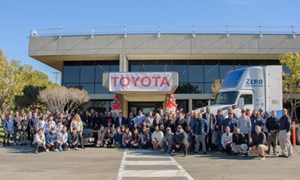News
Toyota establishes H2 headquarters to accelerate advancement of fuel cell technology
Reaffirming its commitment to support fuel cell and additional H2-related products and technology toward a H2 economy, Toyota Motor North America (TMNA) announced that it is renaming the TMNA R&D California office as its new North American H2 Headquarters (H2HQ). The office workspace at the new H2HQ was recently redesigned for its teams working from research and development to commercialization planning and sales of H2-related products and technologies. There are plans to add key features to the H2HQ campus in the future such as a flexible microgrid, sustainable customer education center and more.
“Toyota has developed H2 fuel cell electric solutions for more than three decades, and we will continue to advance this scalable, zero-emission technology as part of our electrified portfolio,” said Ted Ogawa, President and CEO, Toyota Motor North America. “Renaming this facility as North American H2 Headquarters represents our leadership in fuel cell development creating real-world products to help reduce carbon emissions.”
Last year, Toyota Motor Corporation reorganized its H2 business in Japan to create what it calls “H2 Factory” with the idea to bring all H2-related work under one location and accelerate customer-oriented product development and production in fuel cell or H2-related products. Then, Toyota Motor Europe announced its H2 factory with the aim to further grow Toyota’s H2 business and stimulate wider roll-out of H2 ecosystems and infrastructure across Europe.
H2HQ will drive North American-led H2 initiatives and support the localization of global H2-related technologies and products that include light-duty fuel cell applications, heavy-duty fuel cell opportunities, stationary fuel cell power generation, port vehicle applications and more. The facility already provides impressive research and development assets, including Toyota’s largest dynamometer (1.2 MW), a scalable test bench for stationary applications, and a H2 fueling station capable of providing fuel for both light- and heavy-duty vehicles. Moreover, as part of its plans to remain and grow fuel cell leadership, NA H2HQ will be home to several new projects in the coming years.
“I’m very pleased that Toyota is building on its longstanding commitment to California by locating its North American H2 headquarters here in the Golden State,” said California State Senator, District 29, Josh Newman. “The work done there, along with green H2 initiatives throughout the state, is propelling California toward a dynamic, clean-energy economy which will also reduce carbon emissions and foster environmental stewardship while extending California’s leadership in this important space.”
Construction has begun on a flexible microgrid that features energy sources available today, including a 230-kW solar photovoltaic system, a 1-MW stationary proton exchange membrane (PEM) fuel cell generator, 325-kW solid oxide fuel cell (SOFC), and an onsite 500-kWhr battery energy storage system. The microgrid is designed to support the campus’ energy needs, allowing it the ability to operate off-grid. The system is expected to be fully operational by 2026.
“California has ambitious goals to achieve clean air, carbon neutrality and a vibrant economy. Toyota’s investment to expand their research and development of H2 fuel cell technology in our state is an example of the innovation that will accelerate the development and deployment of zero-emissions transportation options, particularly as we decarbonize the goods movement sector,” said CARB Chair Liane Randolph.
In the future, Toyota’s plans for the new North American H2 HQ will include a sustainable education center, available for tours by reservation. The center will be a place for people to learn more about Toyota’s vision of sustainability and the role that H2 will play.


